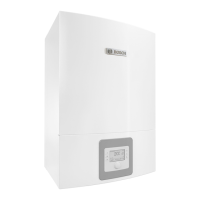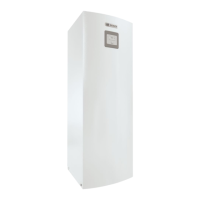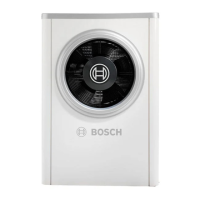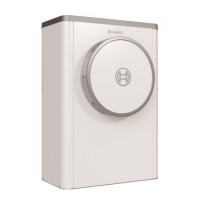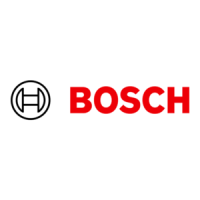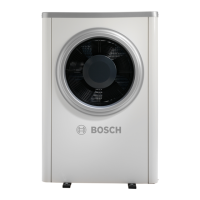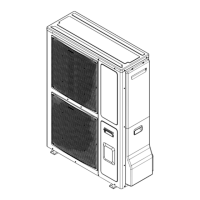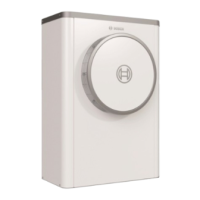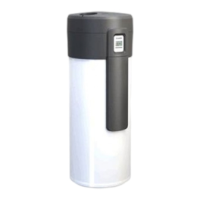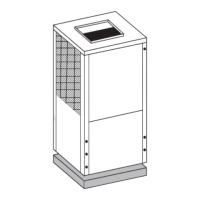Do you have a question about the Bosch Compress 2000 AWF and is the answer not in the manual?
Provides instructions for safe operation, lists required PPE, and includes cautions.
States compliance with UK and EU regulations, referencing a separate document.
Advises reading the manual for proper installation, use, and maintenance.
Highlights risks of unit design, installation, and use, including manufacturer liability.
Specifies the unit's applications for heating and cooling water.
Details outdoor installation needs: location and power characteristics.
Recommends periodic inspections to prevent or reduce costs.
Warns modifications invalidate warranty and manufacturer liability.
Instructs disabling unit and contacting service for spare parts.
Installer must train user on basic operations and maintenance.
Mentions product improvements may alter manual information.
Advises keeping manual accessible for troubleshooting via wiring diagram.
Specifies unit's refrigerant and provides warnings about environmental impact.
Lists refrigerant volume for models and physical properties of R-32.
Details system components with diagrams and tables for different model sizes.
Describes the hydraulic module with diagrams and component lists for various models.
Presents technical specs: ambient temp ranges, height differences, delivery scope.
Notices on product damage, magnet interference, and installation risks.
Instructions for checking transport damage and storage conditions.
Requirements for safe handling, lifting, and movement precautions.
Explains how to remove packaging and the transport bracket.
Provides dimensions and weights for various model ranges with diagrams.
Conditions for optimal unit installation: location, ventilation.
Illustrates standard installation practices and required clearances with diagrams.
Advises protecting the unit from wind, sunlight, rain, and snow.
Details using anchor bolts and anti-vibration mounts for ground installation.
Explains securing the unit to the wall using bracket kits and fixings.
Instructs on placing the unit on the structure using slings and handling precautions.
Describes removing protection panels to access internal parts.
Checks for water circuit, pressure, temperature, and component compatibility.
Discusses water quality, characteristics, and potential corrosion issues.
Covers water circuit connection requirements and piping guidelines.
Details frost protection measures in the water circuit using antifreeze.
Specifies minimum insulation thickness for water pipes based on length.
Explains water volume, system pressure, and expansion tank control.
Provides instructions for filling the system with water before start-up.
Advises on safe practices for electrical connections, including cable type and grounding.
Presents a general wiring diagram of the system with a table of references.
Shows the control box layout for different model ranges.
Identifies the location of electrical and water connections for various models.
Provides specs for compressor and electrical parts, including protection tripping.
Details connections for components via terminal blocks CN11, CN7, and CN30.
Explains the SMART GRID function for photovoltaic management.
Details the function of dip-switches on the control board for various settings.
Explains the user interface, its installation requirements, and components.
Explains keypad, display icons, language selection, and menu structure.
Explains functions accessible only by technicians, requiring a password.
Provides a glossary of technical terms and their meanings.
Details initial unit settings for DHW, Cooling, Heating, and Automatic modes.
Describes selecting supply water temp control or room thermostat control.
Explains using the zone thermostat for managing unit operation and seasonal modes.
Details settings for optional heating sources like boilers or solar thermal.
Explains settings for Holiday Away to protect the system during absence.
Details storing service contacts and phone numbers.
Explains restoring the unit to its factory default settings.
Describes using test mode to check components like valves and pumps.
Details special functions like floor preheating and floor drying.
Explains settings for automatic restart after power supply interruption.
Details settings for limiting power supply to the unit.
Explains settings for cascade systems, including start-up percentage and address reset.
Describes HMI settings for limited access, BMS addresses, and stop bits.
Explains selecting and adjusting climate curves for heating and cooling modes.
Explains the function of each button on the HMI interface for control.
Describes HMI display elements and icons for system status and settings.
Shows how the home page display changes based on system configuration.
Details the menu structure for navigating and accessing various functions.
Explains the customer's access point for daily control and configuration.
Explains how to navigate the menu structure to view and configure settings.
Describes how to unlock the HMI keypad for operation and shows the process.
Explains how to turn the unit on or off using the ON/OFF button.
Details switching unit functions like heating/cooling and DHW on or off.
Explains adjusting system water and DHW temperatures using the interface.
Guides on selecting the operation mode (Heat, Cool, Auto) via the interface.
Explains setting default temperatures for heating, cooling, and DHW modes.
Details setting climate temperatures for automatic indoor temperature adjustment.
Explains the ECO mode function for energy saving and its settings.
Details functions for DHW: Disinfection, Fast DHW, and Tank Heating.
Details settings for the DHW pump (recirculation) and its schedule.
Explains setting timers and weekly schedules for unit operation.
Explains how to check the configured weekly schedule.
Details how to cancel timer settings or the entire weekly schedule.
Details options like Silent Mode, Holiday Away, Holiday at Home, Backup Heater.
Explains the child lock feature to prevent unauthorized access to settings.
Explains service info: service calls, error codes, parameters, display settings.
Lists operational parameters and their values, categorized by section.
Details MODBUS registers for unit controls like ON/OFF and setpoints.
Lists MODBUS registers for unit states: operating frequency, fan speed.
Details MODBUS registers for states of units in cascade systems.
Explains how to access and interpret alarms, including error codes and causes.
Details parameters protected by password, requiring technician access.
Warns of electrical dangers and lists annual maintenance checks for components.
Provides general advice, safety precautions, and troubleshooting for common problems.
Lists causes and corrective actions for common unit issues like no heating/cooling.
Lists error codes, malfunctions, and their causes/corrective actions.
Discusses recycling of packaging materials and used appliances.
Explains regulations and symbols for waste electrical and electronic equipment.
Provides contact details and information on data processing for GDPR compliance.
